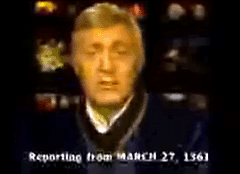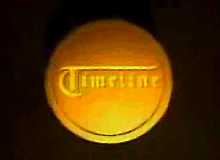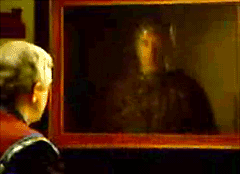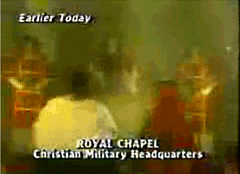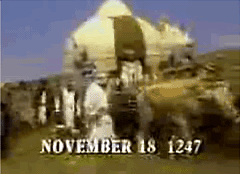|
TIMELINE
SERIES (1989 Feb 22 - Dec 20)
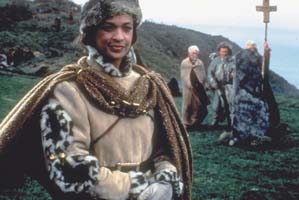
Time travel presumed, never shown
Medieval TV News has no effect on history
|

|
|
Braving those sniper crossbows... to get the story we already know so well.
|
Review by Chris Adams. 2002.05.03. Edited 2003.11.30, 2012.09.29, 2014.07.17, 2023.08.07.
Update 2014.06.20: Producer Leo Eaton has posted
the entire series for everyone's enjoyment on Vimeo.
No, that's not Peter Arnett on some videophone, but rather correspondent Louis de Iean reporting live
from Granada in 1492, to American PBS viewers in 1989. Apparently, the 500-year-old breaking news is that the Moors have been driven from
Spain, and now all the locals are concerned for their religious freedom under the new regime.
What in the Wells is this? Who are these people taking sound bites from the Middle Ages' bloodiest battles? While time travel is never
mentioned explicitly, these field reporters have to be popping about time somehow, since they appear around the globe over a period of four
centuries. Racking your brains trying to imagine why such godlike spanners/immortals have no discernable effect upon the subjects of their
reportage is one of the guilty pleasures of watching Timeline, one of the most obscure well-funded TV productions
of the 1980's.
Anchored from an undisclosed location by one Steven Bell, the Timeline team takes their job with earnest seriousness; the steady
tension in their voices disguising the fact that we know full well the outcome, and they likely do as well. Rarely has this startling mix of
hard history and inexplicably fantastic intrusion ever been attempted.
Delightfully at variance with all common sense, Timeline barrels forward with "file footage" of Viking landings, interviews with kings,
peasants, and every class between, and even has commercials. Yet this is not a Xenaesque departure for the sake of screwing around with famous
dead people. The distributor that now owns the series reports: "Combining dramatic realism, balanced viewpoints, and historical accuracy, this
enterprising six-part series presents history as network news. The program calls for one fictional assumption: contemporary TV coverage existed
when these watershed events occurred. Beyond that imaginative leap, the series possesses a meticulous authenticity: It was produced at a cost of
more than $2 million and shot on location in England, Spain, and Turkey; its settings, costumes, and circumstances have been verified by expert
consultants. (For a Viking scene, black-and-white cows, a genetic impossibility in 1066, were painted brown.)"
Having trawled the web for it in vain for four years, we finally tracked down the series through a Shakespeare Theatre site that praised one
of the Timeline players, Franchelle Stewart Dom. Her 1989 bio provided us extensive credits for the series: "Following her
performance as Lady Macbeth, Ms. Dom traveled to Turkey and Spain to cover the conquests of Constantinople and Granada. Known to medieval
television audiences as Siboletto, an intrepid broadcast journalist from the ancient African city of Zimbabwe, she reports from the field for
'Timeline', a PBS series produced by an international consortium of networks including Maryland Public Broadcasting System, KRLU-Austin and The
Newscast Company of Texas, Turkish Radio and Television, Television Espafiola, and Holmes Associates and Molinare/Visions of Great Britain."
But despite its great expense and high pedigree, the series only has six episodes, and so it has hardly been seen since its original airing.
Producer Leo Eaton came across this review a couple months ago, and was kind enough to write: "Thanks for saying such nice things about a
project that cost three years of blood, sweat & tears (and a lot of laughs). As an aside, my Production Designer was Peter Wooley (PD of Blazing
Saddles, High Anxiety & other Mel Brooks masterpieces), so we came by our history honestly. Regards, Leo Eaton (Long ago Writer/Director/Series
Producer--TIMELINE)"
Update 2014.06.20: Producer Leo Eaton has posted
the entire series for everyone's enjoyment on Vimeo.
Educational supplier Social Studies School Service (formerly Zenger Media)
is the lucky possessor of the series, and now sells it at a premium online. At last, a new generation can puzzle at whether sending camera
crews into critical junctures of medieval history is entirely wise, even if the locals don't seem to mind. Perhaps this is paraversal
narcissism at its most idealistic– exercisizing the power to walk among the figures
and places of the past, and do no harm. A place that inviolably must be imaginary because it cannot exist,
you could never visit it without gently flaking it apart to naught. Or perhaps there is an underlying structure to the locals' obstinancy,
preventing them from accepting that televison radically alters their socioeconomic playing field.
Of course, the series was not created to highlight anachronism and paradox, but to teach people, mainly youngsters, about history.
And among the sober reckonings of the momentous events, the producers deliberately goof on the form they have wrought by adding TV ads–
doubly startling, since it ran on PBS, after all. Our favorite: A serf is strolling by the remains of man on the side of the path. "Why him,
and not you?" asks a narrator. The serf winks at the camera, and pats the protective religious medallion being hawked. And we're still haunted
by the plainsong jingle for the new product, pepper: "Pepper makes it better".
Social Studies School Service has thoughfully provided a 2-minute teaser of each episode:
- THE VIKINGS: September 25, 1066
- THE CRUSADES: October 2, 1187
- THE MONGOL EMPIRE: November 18, 1247
- THE BLACK DEATH: March 27, 1361
- THE FALL OF BYZANTIUM: May 29, 1453
- GRANADA: January 6, 1492
And here's a snippet of reporter Owen of Canarfon, reporting from York in AD 1066: Vikings
defeated [MP3 1.9MB]
The School Service site
also opines: "Because the viewer is eyewitness to moments in history that shaped the way we are today, the series offers a wealth of
discussion opportunities to compare historical events with contemporary issues. 'Things do happen over and over again,' says producer Leo
Eaton. 'In a world, there are parallels.'" The balanced reporting among the various sides of each conflict shows the sharp contrast with the
braying news so common now, only a decade or so after the series was made. Case in point, the overblown graphics of the '90s are utterly absent.
Still, it can't be that hard to imagine a post-WTC-style news ticker for Timeline:
To find the pages to order Timeline, go
here. Failing that,
try an onsite search for "Siboletto"– Social Studies School Service sells too many actual wall timelines to schools to be able to find the
series easily any other way. Also, it helps to be an educational institution, with $400 $170 to blow on something other than teachers' salaries. But
at least this gem is at last to market.
|






